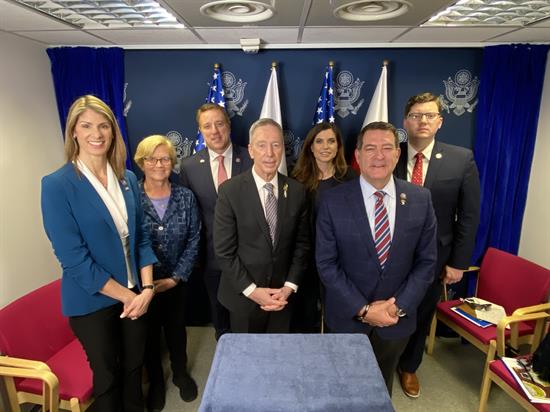Supporting Ukraine
Congressional Delegation to Eastern EuropeAs Russia continues its unprovoked attack on the people of Ukraine, I am working at home and abroad to support Ukraine and our allies through this humanitarian crisis.I joined a bipartisan group of U.S. Representatives on a weeklong trip to bordering allied nations to get a firsthand look at humanitarian efforts and to learn what more can be done to help the millions of refugees and what more we can do to support Ukraine in their fight against autocracy.
The terror President Putin has rained down on Ukrainians—on innocent mothers and children, on the sick and elderly—is horrifying. As President Zelenskyy said in his address to Congress last week, we must do more to help Ukrainians defend their country against Putin's unjust war. What we've seen in Poland, Romania, and Moldova has been truly heart wrenching. Millions of Ukrainian refugees have fled to bordering Eastern European countries seeking safety and shelter in the weeks since Putin's violent invasion began. This trip is giving us first-hand knowledge of how our efforts to support Ukraine and our NATO allies are being implemented. In Romania, Pingree Meets with Prime Minister, Ukrainian Refugees at Border Crossing Congressional Action to Support UkraineSince the beginning of the invasion, Congress has worked to provide emergency funding for security, economic, and humanitarian assistance to Ukraine, ban Russian energy imports to the US, and suspend normal trade relations with Russia and Belarus. Emergency Funding for Ukraine On March 9, 2022 the House of Representatives passed the Ukraine Supplemental Appropriations Act as part of the FY2022 omnibus appropriations legislation. This legislation provides an additional $13.6 billion in security, economic, and humanitarian assistance to help Ukraine and Ukrainian refugees, including:
Legislation to Ban Russian Energy Imports On March 9, 2022 the House of Representatives passed H.R. 6968, the Suspending Energy Imports from Russia Act, which would ban imports of crude oil, petroleum, petroleum fuels, oils, and other energy products from Russia. It would also require the U.S. Trade Representative to condemn the aggression in Ukraine. Legislation to Suspend Trade Relations with Russia and Belarus On March 15, 2022 the House of Representatives passed H.R. 7108, a bill to suspend normal trade relations with Russia and Belarus. Specifically, this legislation would revoke Permanent Normal Trade Relations (PNTR) with Russia and Belarus, which stops them from selling goods in the U.S. at the same preferential duty rates that Ukraine currently receives, and allows the President to raise tariffs on products from Russia and Belarus. The bill will also take steps to review Russia’s and Belarus’ access to the World Trade Organization (WTO) and extends and strengthens the Global Magnitsky Human Rights Accountability Act to allow the U.S. to impose further sanctions on Russia. Other Actions Congresswoman Pingree SupportsAdditionally, Congresswoman Pingree has called on President Biden and other Administration officials to pursue further policies to protect Ukrainians in the U.S., support Ukrainian refugee resettlement in the U.S., and ensure protections for other vulnerable populations. This includes: Temporary Protected Status (TPS) for Ukrainians in the U.S. Congresswoman Pingree signed a letter calling on President Biden and Secretary of Homeland Security Mayorkas to designate Ukraine for TPS, which would provide protection from deportation and access to work authorization for Ukrainians already in the U.S. due to the ongoing armed conflict in their home country. On March 3, 2022 the Department of Homeland Security announced that Ukrainians in the U.S. as of March 1, 2022 will be eligible for the maximum 18-month protection under TPS. Support for Ukrainian Refugee Resettlement in the U.S. Congresswoman Pingree signed a letter to President Biden urging his administration to take additional actions beyond TPS to support Ukrainian refugee resettlement in the U.S. Specifically, the letter requests that the administration:
Additional Protections for Vulnerable Populations Congresswoman Pingree signed a letter to President Biden and Secretary of State Blinken urging them to allow Ukrainian orphans awaiting adoptions by U.S. families to return to the families who previously hosted them. Congresswoman Pingree signed a letter to President Biden urging his administration to prioritize protections for religious minorities and members of the LGBTQ+ population who are currently in and fleeing Ukraine. Biden Administration ActionsIn addition to approving TPS status for Ukrainians in the U.S., the Biden administration has worked in close coordination with our allies and partners to implement a serious of unprecedented sanctions against Russia, as well as to bolster our NATO defenses, deliver critical security assistance to the Ukrainian military, and provide desperately-needed economic and humanitarian assistance to Ukraine and Ukrainian refugees. Specifically: Financial Sanctions The U.S. and our allies have implemented a series of financial sanctions to isolate Russia from the global economy, including:
Trade Sanctions and Additional Actions The Biden administration has also taken actions to limit trade with Russia and implement new export and import restrictions, including:
President Biden also requested that Congress pass legislation to suspend permanent normal trade relations treatment for Russia. In response, the House passed H.R. 7108, a bill to suspend normal trade relations with Russia and Belarus, on March 17, 2022. The legislation is currently awaiting consideration in the Senate. Security and Humanitarian Assistance The Biden administration has provided over $2 billion in security assistance to Ukraine since taking office, with $1 billion in equipment transfers from the Department of Defense (DoD) to the Ukrainian military delivered in just the past few weeks. This assistance includes anti-aircraft and anti-armor systems, helicopters, patrol boats, vehicles, aerial system tracking radars, munitions and ammunition, military medical equipment, demining equipment, and satellite imagery and analysis capabilities. For the most up-to-date information on U.S. humanitarian response funding and programs, please visit: https://www.usaid.gov/humanitarian-assistance/ukraine. |


